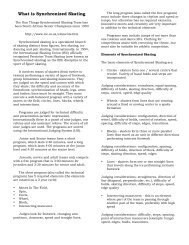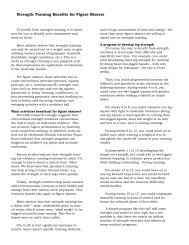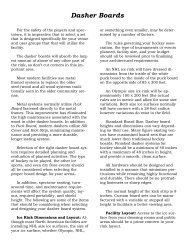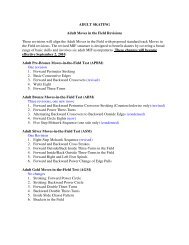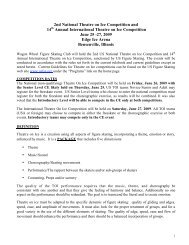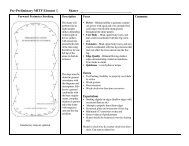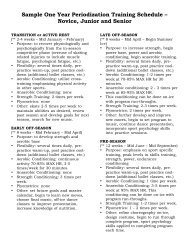Estimating Startup Costs for a New Business - Ice skating resources
Estimating Startup Costs for a New Business - Ice skating resources
Estimating Startup Costs for a New Business - Ice skating resources
You also want an ePaper? Increase the reach of your titles
YUMPU automatically turns print PDFs into web optimized ePapers that Google loves.
<strong>Estimating</strong> <strong>Startup</strong> <strong>Costs</strong> <strong>for</strong> a <strong>New</strong> <strong>Business</strong><br />
<strong>Estimating</strong> the startup expenses <strong>for</strong> a<br />
business requires an approach that<br />
breaks down the process into specific<br />
categories. This process should remove<br />
any mysteries and creates a clear picture<br />
of the amount of funds that will be<br />
needed, on a monthly basis, throughout<br />
the time required <strong>for</strong> construction and to<br />
achieve a realistic breakeven point.<br />
<strong>Startup</strong> Cost Categories<br />
Each type of businesses will have different<br />
types of startup costs. All businesses<br />
will require parking <strong>for</strong> customers,<br />
plus a secured lot <strong>for</strong> company vehicles.<br />
Additional requirements will include <strong>for</strong><br />
example the following:<br />
A Retailer generally needs a storefront,<br />
staff to maintain it, space <strong>for</strong> an office,<br />
and inventory storage, plus restroom<br />
facilities <strong>for</strong> staff and customers.<br />
A Manufacturer needs floor space <strong>for</strong><br />
manufacturing equipment, trained a<br />
staff to operate the equipment, a warehouse,<br />
plus a marketing/distribution<br />
system, space <strong>for</strong> an office, and<br />
restrooms.<br />
A Service business, space <strong>for</strong> an office,<br />
display/reception area, and parts storage/inventory.<br />
A Repair <strong>Business</strong>, space <strong>for</strong> an office,<br />
display/reception area, and parts storage/<br />
inventory.<br />
<strong>Costs</strong> <strong>for</strong> a startup business can be divided<br />
up into six major categories:<br />
1. Cost of sales – Product inventory, raw<br />
materials, manufacturing equipment,<br />
shipping services –<br />
• Mailbox Services<br />
• Digital Printing & Copy Services<br />
• Packing & Shipping Services<br />
• Moving Supplies & Packaging Materials<br />
2. Administrative –<br />
• Mailbox Services<br />
• Digital Printing & Copy Services<br />
• Packing & Shipping Services<br />
• Moving Supplies & Packaging Materials,<br />
packaging, shipping insurance,<br />
warehousing<br />
• Professional fees: Setting up a legal<br />
structure <strong>for</strong> your business (limited<br />
partnership, privately held S corporation,<br />
publicly trades corporation),<br />
trademarks, copyrights, patents,<br />
drafting partnership and nondisclosure<br />
agreements, attorney fees<br />
<strong>for</strong> ongoing consultation, retaining<br />
an accountant<br />
3. Technology costs –<br />
• Computer hardware,<br />
• Computer software,<br />
• Printers,<br />
• Cell phones,<br />
• PDAs,<br />
• Website development and maintenance,<br />
• High-speed internet access and<br />
servers,<br />
• Security Systems<br />
4. Administrative costs –<br />
• <strong>Business</strong> insurance,<br />
• Office supplies,<br />
• Licenses and permits,<br />
• Express shipping and postage,<br />
• Product packaging,<br />
• Parking,<br />
• Rent, Utilities,<br />
• Phones, Copier,<br />
• Fax machine,<br />
• Office equipment - desks, chairs, filing<br />
cabinets<br />
• Other items needed to operate a<br />
business on a daily basis<br />
5. Sales and marketing costs –<br />
• Printing of stationery,<br />
• Marketing materials,
• Advertising,<br />
• Public relations, event or trade show<br />
attendance or sponsorship,<br />
• Trade association or chamber of<br />
commerce membership fees, travel<br />
and entertainment <strong>for</strong> client meetings,<br />
mailing or lead lists<br />
6. Wages and benefits – Temp Agencies<br />
give startup companies a tool to hire<br />
qualified employees quicker, more efficiently<br />
and absolutely risk free. Temporary<br />
employees offer quick, more efficiently<br />
and risk free source of temporary<br />
employees. The Temp agency<br />
charges a fixed price and takes care of -<br />
• Salaries,<br />
• Payroll taxes,<br />
• Benefits<br />
• Workers compensation<br />
– Factor in the time to get your<br />
startup business off the ground –<br />
One critical component of getting an<br />
accurate startup cost estimate is to determine<br />
the length of time it's going to<br />
take you to open your startup business.<br />
No matter what your business type, take<br />
into account everything you will spend,<br />
from the moment you begin the process,<br />
through the time you're ready to sell a<br />
product or service.<br />
The clock starts from the time you sign<br />
a contract, to leasing a building or purchase<br />
land to construct a new building<br />
until the time your business opens and<br />
revenue starts.<br />
Calculate the money needed <strong>for</strong> salaries,<br />
electricity, rent, mortgage payment,<br />
or lease payments during throughout the<br />
entire period of getting ready to open the<br />
business, plus the amount not covered by<br />
revenues which operating the business<br />
until a breakeven point is reached.<br />
Join an industry trade association to<br />
learn about specific costs <strong>for</strong> your new<br />
business and connect with individuals<br />
who can provide insight and analysis<br />
about the companies and people that drive<br />
the industry.<br />
Most industry trade associations usually<br />
have an active group of members who<br />
have successfully navigated the startup<br />
process, and they typically will be happy<br />
to share tips with you.<br />
Access to sample business plans<br />
and checklists <strong>for</strong> your market<br />
niche, but most importantly, you’ll<br />
find out which hidden costs to be<br />
wary of in your industry.<br />
Take every opportunity to network with<br />
business owners in your industry,<br />
whether it's online or in person. They will<br />
have the best understanding of how the<br />
costs of a typical business in your industry<br />
balance out across those six categories.<br />
With that knowledge, you'll be able to<br />
create a reasonable cost estimate <strong>for</strong> starting<br />
a business of your own.<br />
Putting all the pieces together<br />
Once you've pulled together the costs<br />
<strong>for</strong> your startup business, use Cash Management<br />
Reporting software to monitor<br />
and project your monthly cash flow.<br />
Above all, be realistic when calculating<br />
startup costs <strong>for</strong> your new business. The<br />
first calculation may not be the right one.<br />
Continue to refine your analysis by per<strong>for</strong>ming<br />
a range of research service reports<br />
on your emerging venture including a<br />
market analysis, competitive analysis, intellectual<br />
property analysis, technology<br />
analysis, opportunity assessment or a tailored<br />
combination of topics.<br />
Even if you’re satisfied with the final<br />
report, add a miscellaneous budget item<br />
<strong>for</strong> 10% of your total budget. You’ll spend<br />
more than you think to get your that<br />
dream startup business going, and the<br />
"miscellaneous" category will cover any<br />
unexpected costs.
<strong>Business</strong> <strong>Startup</strong> <strong>Costs</strong><br />
Write Offs<br />
One of the basic rules of financial<br />
management is to control all your business<br />
financial needs in one place with access<br />
to extensive business financial research,<br />
data and step-by-step guides.<br />
Every business – both large to small -<br />
must control all business financial needs<br />
through its chief financial who has extensive<br />
business experience in researching<br />
revenue streams and sources, data management,<br />
and an understanding of the implications<br />
of state and federal tax laws and<br />
regulations.<br />
– – Long term successful businesses:<br />
expenses must be offset by revenues –<br />
Some expenses, like meals and entertainment,<br />
may be only partially deductible.<br />
Other expenses may have to be amortized,<br />
or "depreciated," over a period of<br />
years. But the basic fundamental concept<br />
- revenues justifying expenses - is still<br />
pretty easy to understand and explain.<br />
The expenses that occur be<strong>for</strong>e the<br />
business opens are referred to as business<br />
startup costs. Depending on the type of<br />
business, there are specific tax requirements<br />
on what can be charged as a 100%<br />
expense and those that must be amortized<br />
<strong>for</strong> specific number of years depending on<br />
the asset classification.<br />
There are accounting firms that offer a<br />
comprehensive understanding on how to<br />
file the business tax <strong>for</strong>ms <strong>for</strong> partnerships<br />
and corporations and depending on<br />
which state the business headquarters are<br />
located.<br />
Once you open your business and start<br />
generating revenues, you can write off<br />
many of those initial business startup<br />
costs at tax time.<br />
The bad news is that the rules <strong>for</strong> taking<br />
advantage of these deductions is not<br />
as straight <strong>for</strong>ward as they are <strong>for</strong> a business's<br />
everyday, ordinary, ongoing daily<br />
expenses.<br />
Other Articles of Interest<br />
<strong>Business</strong> Planning Articles<br />
Little Strategies <strong>for</strong> Saving Big Tax Dollars<br />
Tax Savings: How to Save Taxes Be<strong>for</strong>e<br />
Year-End<br />
White Paper on Ecommerce Sales Tax<br />
There are basic steps to deducting your<br />
business startup costs as you start a business.<br />
Track your business startup costs<br />
from the beginning.<br />
<strong>Startup</strong> expenses are things associated<br />
with setting up your business or investigating<br />
the purchase of an existing<br />
business. Among the items that count as<br />
startup expenses includes a range of research<br />
service reports, including an:<br />
Analysis of –<br />
• Markets,<br />
• Competition,<br />
• Intellectual property,<br />
• Technology,<br />
• Opportunity assessment<br />
• A combination of topics.<br />
Paying <strong>for</strong> consultants<br />
Buying initial supplies<br />
Advertising your new business<br />
Paying employees be<strong>for</strong>e the business<br />
opens<br />
Track your organizational costs - the<br />
fees associated with initially organizing<br />
your new business. Among the expenses<br />
that can qualify as an organizational cost:<br />
• State incorporation fees<br />
• Lawyers' charges <strong>for</strong> drafting incorporation<br />
papers<br />
• Initial accounting fees
Once you've written off that first<br />
$5,000, you can still get a tax benefit from<br />
other expenses. However, those startup<br />
costs will have to be written off, or amortized,<br />
over 15 years.<br />
The assets - equipment and furniture -<br />
purchased <strong>for</strong> the startup can be written<br />
off. However, unlike supplies and other<br />
expenses, assets have to be depreciated.<br />
There are different rules <strong>for</strong> different assets.<br />
Most office equipment, <strong>for</strong> example,<br />
could be written off over seven years;<br />
computers can be deducted over a fiveyear<br />
period.<br />
It might be easier to rent or lease office<br />
equipment and delay purchases that can<br />
be put off until after the business opens.<br />
The same purchase made after opening<br />
could be written off in full in the first year<br />
instead of depreciated over 15 years.<br />
In some cases, owners of startups may<br />
prefer to stretch out deductions over several<br />
years so that they balance out more<br />
evenly against eventual revenue streams.<br />
Consult with a certified tax attorney/CPA<br />
to determine n the best expenseand<br />
tax-planning strategies <strong>for</strong> your<br />
startup venture.



